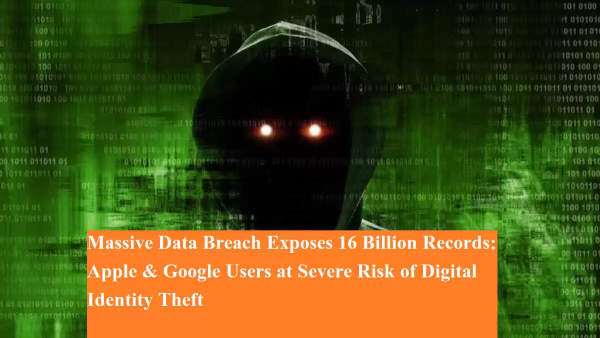
In what’s being called the largest data breach in history, over 16 billion login credentials — including those of Apple and Google users — have reportedly been leaked online. The fallout from this breach could affect billions of people worldwide, putting their digital identities, financial accounts, and private data in immediate danger.
💣 What Happened?
According to an explosive report by Forbes, more than 184 million records were found on an unprotected web server. Cybersecurity researchers discovered over 30 distinct datasets, which may contain 3.5 billion+ user records, potentially including usernames, passwords, email IDs, and even VPN login credentials from corporate and developer platforms.
This breach is being described as one of the most serious cyber threats to date, with the potential to spark a global digital security crisis.
🧠 Why Is the Leak of Apple and Google IDs So Dangerous?
Today, Google and Apple accounts are far more than just email credentials. They are central to our:
-
Banking access
-
Cloud storage (Google Drive, iCloud)
-
Social media integrations
-
E-commerce and subscription services
-
Work and communication platforms
Once compromised, hackers can gain full control of your digital life, including sensitive personal documents, financial data, social media profiles, and even corporate access.
⚠️ The Real Risks You Need to Know
This breach opens the door to a variety of cyber threats, such as:
1. Phishing Attacks
With email IDs and partial account details leaked, cybercriminals can send deceptively authentic messages, tricking users into revealing OTPs, passwords, or payment information.
2. Account Hijacking
If your credentials are in these breached datasets, hackers may log in to your accounts, reset passwords, or lock you out permanently — even drain linked bank accounts.
3. Identity Theft
Stolen data can be used to impersonate individuals, apply for loans, open fraudulent accounts, or even blackmail victims using sensitive personal files.
4. Corporate Espionage
The breach also includes VPN login credentials, making it a massive threat to businesses, developers, and IT platforms. A compromised VPN can give hackers access to entire internal networks.
🛡️ What Can You Do Right Now?
In light of this unprecedented breach, here are urgent steps every user must take:
✅ 1. Change Your Passwords Immediately
Especially for your Google, Apple, banking, and email accounts. Use complex combinations and avoid reusing old passwords.
✅ 2. Enable Two-Factor Authentication (2FA)
This adds an extra layer of protection, even if your password is compromised. Use:
-
Authenticator apps (e.g., Google Authenticator, Authy)
-
Hardware tokens (e.g., YubiKey)
-
Biometric logins where possible
✅ 3. Be Wary of Suspicious Emails or Messages
Avoid clicking on unfamiliar links or downloading attachments. Look for misspellings, odd email addresses, and unverified senders.
✅ 4. Monitor Your Accounts Regularly
Check for any unauthorized logins, password reset attempts, or unusual transactions. Set up instant notifications from your bank and email providers.
✅ 5. Use a Password Manager
Tools like LastPass, Bitwarden, or 1Password can generate and store strong passwords securely.
🔍 Final Thoughts
This data breach is a wake-up call for billions of users. Digital platforms like Google and Apple are deeply integrated into our everyday lives, and compromising them can destroy trust and security in our online identities. While tech companies continue to investigate and reinforce systems, the onus is on users to act fast, stay alert, and adopt robust cybersecurity habits.
The digital world is only as secure as the weakest link — don’t let it be you.
-
Chinese superstar Fan Bingbing shares rare family photos

-
Glow Gently with Acne-Prone Skin

-
Benefits of Potato Juice: Potato juice works like a natural medicine, drinking daily will be tremendous benefits …

-
The Most Feel-Good Song Ever Written, According To Research

-
Much-Deserved Success Arrives For 3 Zodiac Signs On June 21, 2025
